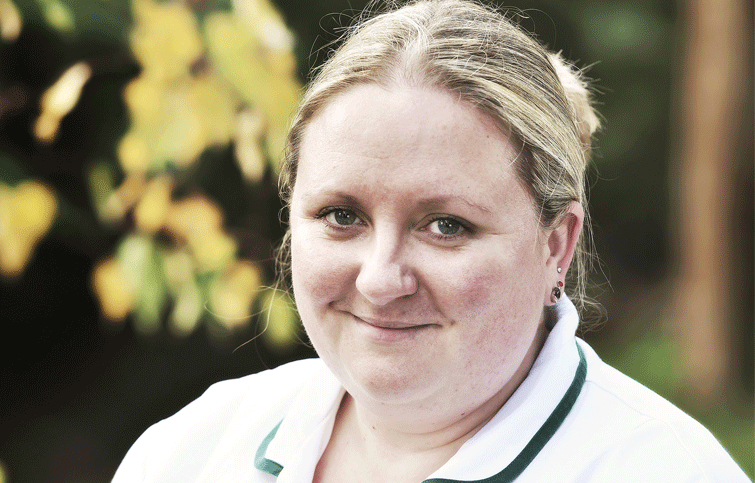Make a difference
People like you help us every day through regular donations
Read stories DonateLaura Murton is a specialist occupational therapist at St Helena Hospice working out in the community in people's homes. During national Occupational Therapy Week, 7th to 13th November, Laura explains occupational therapy (also known as OT)...
I qualified in 2011 at the University of Essex and have a background of working in both the healthcare private sector and the NHS. During my student training I was fortunate enough to have a placement at St Helena and was working in a nursing home, both of which ignited my interest for palliative care.
I have now worked at St Helena for over 7 years and during that time, have had the opportunity to develop my role and some of our services. Being the only occupational therapist in the Hospice in the Home multidisciplinary team (MDT) and being community-based, I often find myself explaining to students, patients, families and new members of the team what an occupational therapist actually does.
Occupational therapists complete a full holistic assessment and look at the physical, emotional, social, cultural and spiritual needs of an individual as well as assessing the environment. We understand people’s everyday activities, roles and routines and help to unpick the reasons for some difficulties, the impact of these, and help the individual to understand and overcome these difficulties.
Here are some of the myths we need to bust...
FALSE Occupation refers to a person’s life role such as mother or brother. If something happens in your life such as an illness or an accident, it is an occupational therapists role to help you return to your job of ‘living’. The goal of occupational therapy is to help live life your way.
FALSE This is a very common misconception and the two are separate professions. Occupational therapy is not just about your job or your work. For occupational therapists, ‘occupation’ means anything that you are engaged in or do on any given day. It is an occupational therapist's role to help overcome the challenges which people may face with any particular occupation, to help them live independently.
FALSE Although occupational therapist and physiotherapists work closely together and can overlap, we are separate disciplines. We place the patient at the centre of all we do and are part of the wider multidisciplinary team including doctors, clinical nurse specialists and family support workers. Occupational therapists focus on what people need in their daily lives; physiotherapists focus more on strength and movement.
FALSE Occupational therapists are trained in both physical and mental health, and can offer advice, suggestions and techniques to improve quality of life. We have a broad range of knowledge and skills across anatomy, mental health, psychology and communication.
FALSE Occupational therapy is very versatile and there are many areas of specialism and emerging roles as occupational therapists have transferable skills. Areas of work may include dementia, care homes, research, hand therapy, pain management and palliative care.
FALSE Occupational therapists work with people of all ages. 1/3 of the national occupational therapy caseload is with children and young people. Many adults need occupational therapy for a variety of reasons such as stroke, neurological conditions and cardiorespiratory conditions.
FALSE Equipment, aids and adaptations may sometimes be prescribed to help maintain someone's level of function or independence. Occupational therapists are problem solvers and advise on non-pharmacological symptom management and techniques such as management of fatigue and anxiety. We help to support the individual and their family and carers with manual handling advice and emotional support. Providing equipment is probably only about 10% of what occupational therapists actually do.
FALSE Assessments can be completed via games and puzzles and through task analysis. This can help to assess coordination, strength, memory and function using meaningful activity in a more familiar setting.
Getting an occupational therapy qualification is easy
FALSE Currently the training is three years full time at university to complete a degree to become an occupational therapist; this includes many hours of theory, lectures and on the job placements. Apprenticeships are now becoming more widely available which cover four years of on the job training and attending weekly university lectures. Many senior posts require a Masters degree in addition to an occupational therapy degree.
Tarnya Robey, therapy assistant who works alongside me in the team, is starting her apprenticeship pathway to becoming an occupational therapist and training at the University of Essex. I am proud to be able to support with this and help to train the next generation of occupational therapists.

When you make a donation to St Helena Hospice, we are charged transactional fees by other companies, including fees for processing payments made to us, looking up addresses and validating bank account details.
We are very grateful to our donors who offer to offset some of these fees with a minor addition to their total amount. This is however completely optional and we are very grateful for your support whether or not you choose to contribute to processing fees.
CloseWe are able to claim an extra 25p on every £1 on your donation amount for no extra cost to you, as long as you are a UK tax payer; have paid enough income tax or capital gains tax in that tax year; and are donating your own money. If you pay less income tax and/or capital gains tax than the amount of Gift Aid claimed on all of your donations in that tax year it is your responsibility to pay any difference. For more information about Gift Aid, please visit https://www.gov.uk/donating-to-charity/gift-aid
